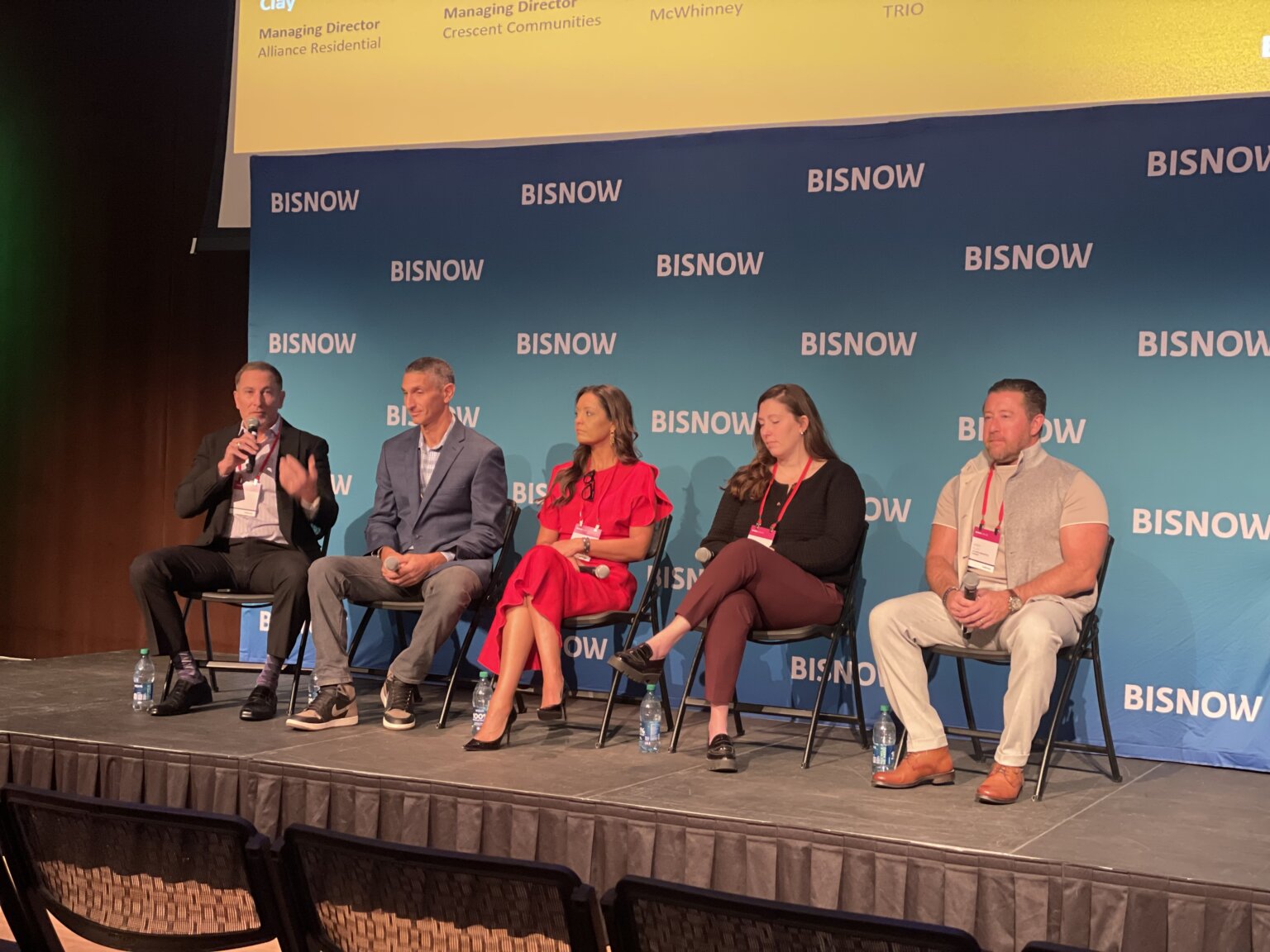The BisNow Annual Multifamily Conference in Denver, Colorado gathered industry leaders to discuss the latest trends, challenges, and innovations shaping Denver’s multifamily and real estate sector. From modular construction to creative financing solutions, here’s a breakdown of the event’s major themes.
Modular Construction: A Game Changer for Multifamily
The conference opened with Ken Puncerelli, Founder & CEO of LAI Design Group, who spoke about modular construction as a leading innovation in multifamily housing. Modular construction, also known as prefabrication or off-site construction, is a building method that involves constructing components in a factory and then assembling them on-site
Ken highlighted the key advantages of modular, which include:
- Speed to market: Construction can typically be 40-60% faster than traditional methods.
- Cost savings: Modular construction can eliminate up to 50-60% of construction costs because the building is done in a factor rather than on site.
- Fewer trades required: Ideal for remote areas with short construction seasons.
- Better quality control: Factory precision improves overall build quality.
- Environmentally sustainable: Modular construction can be more environmentally sustainable than traditional construction methods.
However, modular construction is not for every new build. Challenges to this type of construction involve logistics, particularly transportation because each piece is extremely large and things like avoiding overhead power lines, navigating the state review process, early-stage financing, and insurance issues.
Finding Creative Financing Solutions
This first panel focused on how to get creative with financing in the multifamily industry. With a candid assessment of the tough financial environment – especially in rapidly growing areas like Denver has experienced in the past 10 – 15 years. Eliot Marks, Managing Director for Hines, discussed the difficulty of securing financing for developers, as rents flatline and interest rates rise in our current economy. He also emphasized that walking away from deals demanding too much is sometimes the best option.
Bobby Hutchinson, CIO of RedPeak, touched on the growing challenge of managing older buildings, especially with the Energize Denver Act, where commercial buildings larger than 25,000 sq ft must meet energy performance targets based on their Energy Use Intensity (EUI). Fines for non-compliance to this energy regulation ordinance are significant, and many felt this act was more idealistic than practical, leaving private building owners with heavy costs and limited infrastructure support.
Speakers also addressed the complexities of affordable and middle-income housing. They underscored the importance of public-private partnerships and creative solutions like tax increment financing (TIF), a public financing method that uses future property tax revenue increases to fund community improvement projects, to acquire free land and develop much-needed middle-income housing. Although, a key question remains: what does “affordable” actual mean, and how can the public and private sectors work together to meet these goals?
Understanding the Modern Multifamily Resident
The second panel of the day explored the evolving definition of the modern multifamily resident. With a projected 100,000-unit deficit in single-family rentals (SFR) and multifamily housing in Denver this year, there’s been a shift in how renters view housing. Many now embrace technology and expect a streamlined, convenient experience—from booking tours online to self-guided tours of properties.
Panelists noted that the modern resident is:
- Tech-savvy: Highly receptive to tech-driven solutions, such as leasing through apps or digital portals.
- Community-focused: Seeks connection, grounding, and community spaces, but not necessarily the latest shiny amenities.
- Cost-conscious: With renters now comparing 4-6 properties on average, cost and how the space is designed are key considerations.
Analyzing the data also play a crucial role in knowing how to appeal to today’s renters. Speakers emphasized the importance of using data to inform design decisions, ensuring that spaces are both functional and aligned with resident preferences. For example, human-centric and activated designs (such as a baristas making someone’s coffee instead of an automated coffee stand) are becoming much more desirable to today’s resident.
When it comes to resident retention, the panelists agreed that community engagement is critical. Events, social connections, and responsive property management can make or break a renewal decision. A surprising takeaway from the data that was analyzed was that the more friends a resident makes within a building, the more likely they are to renew their lease.
Navigating Multifamily Headwinds
The BisNow event closed with an outlook on the multifamily market’s future and the incoming headwinds to expect. Denver’s construction market remains tight, and rents are only rising so far, leaving a precarious balance over the next 12-18 months. With interest rates and construction costs at all-time highs, many developers are focusing on upgrading existing buildings rather than embarking on new projects.
Concerns about both national, local and state legislation that impact building development, land ownership, interest rates and in general the economy, are widespread. Many developers are feeling pressured by regulatory requirements that don’t match market realities, such as the requirement of EV charging stations at apartment communities when only 1/3 of the stations are needed for residents or sustainability requirements when residents aren’t willing to pay for those efforts.
Panelists emphasized that they will always meet the market where they are at and argued for less legislation involvement in order to keep rents and other costs as reasonable as possible. Some also predicted that Colorado’s housing market may soon surpass San Francisco’s in terms of affordability challenges.
Conclusion
The BisNow Denver Multifamily Conference shed light on the critical issues impacting Denver’s housing market, from modular construction innovations to affordable housing challenges. As developers, construction teams, property management companies and more navigate an increasingly complex landscape, solutions will require creative financing, thoughtful design, data analysis and stronger public-private partnerships to meet the needs of the modern resident and overcome legislative barriers.








